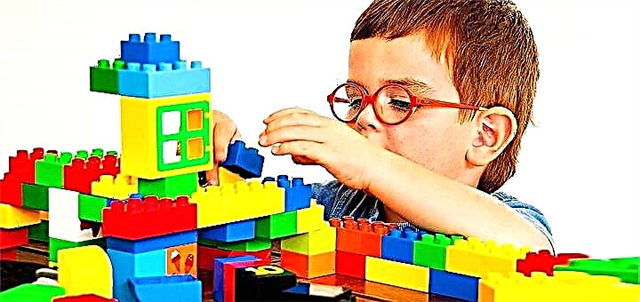Children are great conservatives. They easily bring traditions and rituals into life. The certainty that the morning will begin with a kiss from mom, and dad will read the evening fairy tale, helps the child to navigate this “incomprehensible” life. Everything new is at first met with caution. It is important for parents to remember this in order to raise a healthy person who can appreciate traditions. The kid carefully keeps little "secrets": his mother's blown kiss in front of the kindergarten door, a candy on duty in his pocket, which appears from nowhere every morning. The day will be familiar. Rituals can be favorite, uninteresting, obligatory. The child is ready to put up with this. Lack of orderliness in life doom the baby to nervous breakdowns, whims, riots. This is his defensive reaction to the unknown.

Sometimes traditions and rituals are themselves established in the family, then the child naturally fits into the general rules. It can be Sunday dinners at grandma's or a family trip to the park on Saturdays. The kid waits all week for the weekend, tries to behave well in the kindergarten, learns new things: it's nice to receive praise from his beloved grandmother.
A certain system of child behavior is formed by the parents intentionally. This is compliance with the daily regimen, nutrition, brushing teeth, washing hands before eating. Even dressing in pajamas before bed makes it easier to fall asleep if it's become a ritual.
Adults know that the child needs to rest, so they send him to bed no later than ten in the evening. Well, if this ritual is observed invariably, then the very mention of the time of sleep creates a calm, pacifying mood. A child should not be allowed to break the regime for good behavior. In this case, going to sleep will be perceived by him as a punishment. A sleepy baby in the morning will be easily aroused, capricious, and will not be able to concentrate on class.
Besides the health benefits and receptiveness to knowledge, there are rituals that are just as important in raising children.
Part 1
Instill confidence
The child loves to live in a predictable world. Waking up, know that your favorite pancakes will be for breakfast. When he leaves school he will be greeted by his mother's smile. Dad will be home from work at six in the evening. Cartoons will be shown on TV at eight in the evening.
When there are no strict rules in the family, and life is based on surprises, the child tries to gain support by introducing his own rituals. Over time, they can turn into obsessive habits. Example? Drink only from your mug, make a scandal because your favorite shirt is in the wash, and he will never go in a new one.
Cultivate sensible habits
The daily ritual of morning water procedures should become uncontested. Also, washing hands before eating, after using the toilet, after walking. Brushing your teeth in the morning and evening.
Even if you are late, you cannot allow your child to cancel these procedures. Just one indulgence, and in the future, without adult supervision, rest assured, no one will do anything.
If dad gives way to a woman or elderly people in transport and teaches his son this, this habit of a well-mannered person will become automatic for him, and not by compulsion.
The family should have rules that everyone follows: do not drink milk or juice from a bag, do not grab pieces before dinner, do not start eating until all the household members have sat down, and much more. It all starts with the family.
Painless adaptation to new life stages
Admission to kindergarten, school, moving are accompanied by stress for the child. You can come up with little rituals that create positive emotions.
For example, on the way to the kindergarten, go to a cafe and have a milkshake. On the bus, allow yourself to pay for the trip. In the evening, the child can see off the outgoing day by crossing out the date on the calendar.
Foster patience
Five working days should be perceived by the child as working days. Waiting for the weekend, which will include a long-awaited trip to the zoo or a family lunch at a cafe, helps to be more collected all week.
Small victories and new knowledge are dedicated to the coming weekend. The anticipation of rest helps to become patient, it is easier to deal with temporary failures and difficulties in adulthood.
The child must understand that by his own work and good behavior he creates for himself a joyful well-deserved rest. Daily entertainment loses its relevance over time and is perceived with boredom.
Traditions for life
Every adult has fond memories of childhood. They are often associated with family traditions.
Prepare gifts for March 8 with dad for mom and grandmother. Decorate the Christmas tree for the New Year with the whole family. Celebrate the annual holiday of the cottage, celebrated only by you. Even the recipe for great-grandmother's pies is carefully passed on from elders to younger ones.
These are the braces presented by the parents to the future young family.
Organization and composure
Often in families you can see a variety of graphs, tables, colorful calendars on the walls. Such visual agitation helps the child get used to performing the necessary actions. For example, a funny chain of steps, reflected in the picture, will not let the kid forget the order of the morning toilet.
Only by looking at the thematic homemade clock, the child will remember the time to do homework or the need to wash the dishes.
In the hallway, it is useful to hang a bright list of what should be in the student's portfolio. Looking at him, the child will check if he has forgotten anything.
It can become a tradition to mark birthdays and holidays on the calendar when a new month comes. The kid will be able to prepare ahead of time for them.
Rituals are not dogma
There are no rules that are never broken. On vacation, in nature, in special situations, some rituals are stopped. It is right. Rituals and traditions should organically enter the life of children. Their unconditional fulfillment borders on fanaticism.
These rare deviations only attract the kid to the usual rules, as to the guarantors of stability and tranquility.
Part 2

Children are most often lovers of consistency. It is stability that instills confidence in them. They are calm if they know exactly what will happen and how. It's great when in such a diverse, slightly frightening and volatile world, there is something that always remains constant. It has a calming effect, allows you to maintain a normal psycho-emotional state. The constant becomes a kind of base, a reference point from which you can start and continue to move forward, development. It is interesting that it is precisely the changing life of a child, the transition to another environment, a collective that further increases the value of something that remains constant. After all, the children have to go to kindergarten, and then to school. Everything is connected with stresses, cardinal changes. In this regard, the importance of children's rituals is very great. They instill confidence in the child, bring stability and predictability to his life.
Most often, the unknown becomes the cause of the experience. Adults also strive to create a kind of illusion of stability, since it is not easy to survive in an ever-changing and unreliable world. The surrounding people and events put pressure on the psyche, human consciousness, constant transformations injure the nervous system. As a result, a person experiences psychological discomfort, is constantly in a state of stress. Adults create various substitutes for stability, its external manifestations: contracts, obligations with guarantees, insurance.
Children are not yet able to support themselves with such official papers that replace stability. But the young members of society have their own rituals that help them adapt and live normally. Children's rituals can be:
- Some kids can calmly part with their mothers, being in kindergarten, only after they wave their hand at the window;
- Many children love to ask them to read one story before bed;
- Often, babies fall asleep more easily if they prepare for bed in a given order, performing their usual actions;
- Almost every child has a favorite toy, a kind of totem, which always lies with him in the crib;
- Someone comes up with their own ways to say goodbye, say hello when they meet.
Here are some specific examples from the lives of children!
Children's rituals: real-life examples
Rituals are closely related to the concept of rhythm and daily routine. Many arise on their own, while others are intentionally set by the parents. They may be different, but they have one thing in common - they help to make our day useful, effective and enjoyable.
Watching the program “Good night, kids!”, Brushing your teeth, bathing, reading your favorite book, singing a lullaby, dressing in familiar pajamas, drinking milk or water, falling asleep with a pacifier, putting toys to bed, saying good night are all examples of children's rituals before sleep.
According to the famous doctor Komarovsky, from the very beginning of these rituals, “the work of the nervous system, respiration, and blood circulation begins to change, and literally 15-20 minutes is enough for it to work and the child falls asleep”.
It is interesting to consider specific rituals for children that have become traditional in families:
I made these observations and became interested in rituals. We have established many rituals in kindergarten, reinforcing all the regime moments with them.
Before dinner began, everyone wished him bon appetit, and then threw up their hands. The children said together that they would eat and grow "Like this".
When the guys came to the kindergarten from a walk, it was necessary to count the shoulder blades. After all, it is necessary to find out whether the shovels have been lost, whether they have collected everything.
Before going to bed, I "conjured" each child to have good dreams. It was enough to hold your hands over the child's head, pronounce "Magic spell", and then gently blow on the forehead so that the child falls asleep calmly. After all, he already believed in the magical power of the ritual! Therefore, I fell asleep with pleasure.
Thus, it was with the help of all kinds of rituals in the kindergarten group that a special comfortable environment was created, and the kids went through the stage of adaptation in the kindergarten / collective, unusual environment much easier, got used to new tasks, responsibilities and lifestyle.
Do you want your child to always feel good, his psychological state was stable? Then get started creating your own rituals! They play a huge role in the life of the baby: they help to program his consciousness, calm the nervous system, and support in any situation. Then, when your baby grows up, he will fondly remember his childhood rituals.

Please note that the rituals already adopted must be carefully followed. I know of many cases when children fell into real panic if the rituals were violated. For example, if a child has forgotten a favorite toy that constantly accompanies him in the kindergarten, he must return home for it. When a girl is accustomed to falling asleep in the kindergarten exclusively in blue pajamas, there is no need to bring her another one. This will cause stress. When dad accidentally forgot to wave to his son in the window, the kid was terribly struck and upset. Remember this! Performing children's rituals carefully is extremely important. Do not think that this is a whim. It is just such family traditions that allow you to maintain a good emotional state of the kids.
I remember my childhood ritual, thanks to which I was not afraid to fall asleep. Before that, I always feared that after sleep, waking up, I would find myself in another place. After all, unknown monsters can steal me while I sleep, I thought. The fear of night monsters fettered me, prevented me from falling asleep. But these monsters were afraid of my toy dog. Trezor bravely protected me from monsters every night, and in the morning I always kissed him gratefully on the nose.
Children's rituals sometimes get an unexpected continuation when the kids are already growing up. I turned 17 years old, I had to go to a strange city in order to start studying at the institute there. And now I am on the doorstep, and in my hands is a bag with a ticket. My mom was worried about how I would settle in a new place, alone, a very young girl. Suddenly, my mother ran to the nursery, and returned with the same Trezor. She said that I forgot my favorite stuffed dog. I decided to leave him on purpose, considering myself an adult. But now the toy was already becoming a guarantee of my mother's peace of mind. And mother became less anxious when her already grown daughter went to college with a stuffed dog in her bag. The children's ritual helped her restore emotional balance. And Trezor became my talisman again! Before the exams, I kissed him on the nose again.
Psychologists unanimously argue that with the help of ordered behavior, the child understands the structure of the world, this is how the boundaries of behavior are established and self-awareness comes. In addition, children's rituals make the child more confident. After all, the exact observance of certain actions always leads to a predictable and known result.
Think, maybe you will remember your rituals.
Doctor Komarovsky tells why and what rituals should be performed with the child before bedtime:



